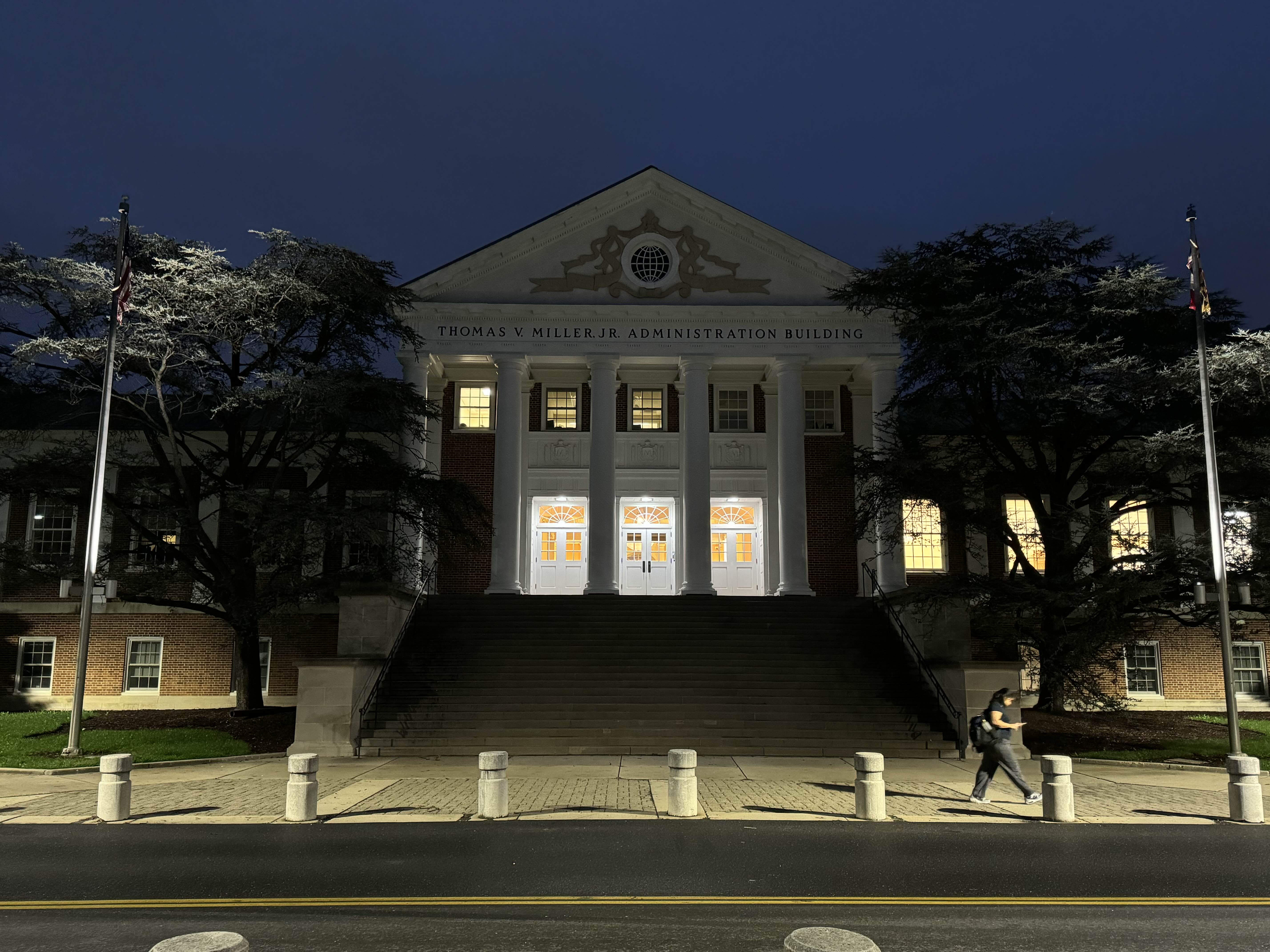Federal judge orders UMD to allow October 7 demonstrations

A view of the Thomas V. Miller Jr. Administration Building, where the university president's office is located. ZFJ/Alvin Wu
COLLEGE PARK, Md., Oct. 5 (ZFJ) — A federal judge ordered the University of Maryland, College Park, to allow UMD Students for Justice in Palestine (SJP) to proceed with their demonstration on Monday, Oct. 7.
The significance of Oct. 7, 2023, is that it was the day when Hamas militants stormed into nearby Israeli towns from the blockaded Gaza Strip to kill and take hostage hundreds of civilians. The attack coincided with a major Jewish holiday and shocked Israel’s military and intelligence officials. The Israeli government immediately declared war on Hamas and has been prosecuting it since.
SJP took UMD to federal court, represented by the Council on American-Islamic Relations (CAIR) and Palestine Legal. The American Civil Liberties Union (ACLU) filed an amicus brief in support of SJP.
In light of the planned demonstration date rapidly approaching, the most imminent matter before the court was SJP’s request for a preliminary injunction against the university.
U.S. District Judge Peter J. Messitte granted SJP’s motion for preliminary injunction on Tuesday, Oct. 1, after hearing arguments and testimony the day before in the Maryland district court’s Greenbelt location. He denied their request to remove the ban on other University System of Maryland colleges without prejudice.
MEMORANDUM OPINION
The crux of the judge’s decision was that the university had decided to limit student events based on the expected content of the demonstration, thus violating the First Amendment.
The University submits that its decision is a narrowly tailored, neutral time, place, and manner restriction. But in the Court’s view the decision of the University to revoke SJP’s reservation was clearly neither viewpoint- nor content-neutral. It came about for reasons that the Constitution simply does not countenance: fear of disruption, and anger of opponents.
— U.S. District Judge Peter J. Messitte, memorandum opinion
Citing prior cases, Messitte observed that the First Amendment exists to “to shield just those choices of content that in someone’s eyes are misguided, or even hurtful.”
“Even if outrageous words cause pain, ‘we cannot react to that pain by punishing the speaker. As a Nation we have chosen a different course—to protect even hurtful speech on public issues to ensure that we do not stifle public debate.’”
The judge acknowledged that the university’s concern about possible violence at the protest was “not unreasonable.” Dr. Patricia A. Perillo, vice president of student affairs, and David Mitchell, chief of the University of Maryland Police Department, wrote in affidavits submitted as evidence that the university had been receiving “an intense barrage of concerning communications” with “more threatening and violent language that had been seen in the past.”
One email addressed to UMD President Darryll J. Pines, submitted as evidence by the university, reads, “If you are going to allow this display of uneducated hatred…then my Klan Rally with sheets and a noose are also approved. We will be looking to hang several look alike [sic] to key university staff.”
However, based on Chief Mitchell’s testimony in court, Messitte concluded that less restrictive security measures are available that would allow the event to proceed without restricting speech.
Options include, for example, hiring extra security guards, requesting assistance from local and state police, using temporary metal detectors, setting up crowd control fencing, and checking student IDs.
Messitte set a bond of $2,500 for SJP, in line with UMD’s request for a minimal bond amount. The court reminded SJP that illegal conduct not protected by the First Amendment could result in arrests or expulsions, and that university policies for campus events will, as they stand, apply in full.
UNIVERSITY RESPONSE
In a campus wide email, UMD President Darryll J. Pines stated that the university has allowed student groups to make reservations on Oct. 7 in line with the court order.
Pines stressed the importance of campus safety to university officials and reiterated the results of the campus police’s safety assessment.
“In compliance with the court’s decision, we will now move forward with the events, addressing the concerns and challenges associated with them with care and caution, including the implementation of a robust safety plan,” he said in his statement. “This includes enhanced staffing and resources with a strong security presence.”
PLAINTIFF REACTIONS
UMD SJP celebrated their legal victory in a statement posted to Instagram, declaring, “We refuse to allow attempts to cancel our reservations to stop our message.”
“Students for Justice in Palestine worked with Jewish Voice for Peace to commemorate this date to highlight the death and destruction caused by this ongoing genocide, on, before, and since October 7, 2023. This unambiguous truth was too much to handle for our administration and they chose to cancel our event, rather than make efforts to protect us.”
CAIR and Palestine Legal welcomed the court’s decision.
“We’re thrilled with the court’s decision. If the First Amendment didn’t protect students who seek to mourn a genocide and educate the public about it, then it’s meaningless,” said Gadeir Abbas, deputy litigation director at CAIR. “Universities that have harassed and punished advocates for Palestine across the country should take note.”
The case is University of Maryland Students for Justice in Palestine v. Board of Regents of the University System of Maryland et al (8:24-cv-02683-PJM).
References
- U.S. District Court for the District of Maryland - University of Maryland Students for Justice in Palestine v. Board of Regents of the University System of Maryland et al (8:24-cv-02683-PJM) - 1 Verified Complaint for Civil Rights Violations - https://www.zfjnews.com/2024/domestic-affairs/1%20SJP%20v.%20UMD%20Complaint.pdf
- U.S. District Court for the District of Maryland - University of Maryland Students for Justice in Palestine v. Board of Regents of the University System of Maryland et al (8:24-cv-02683-PJM) - 23 Defendants’ Response to Inquiry Requesting Certain Documents - https://www.zfjnews.com/2024/domestic-affairs/23%20SJP%20v.%20UMD%20Response.pdf
- U.S. District Court for the District of Maryland - University of Maryland Students for Justice in Palestine v. Board of Regents of the University System of Maryland et al (8:24-cv-02683-PJM) - 27 Memorandum in Opposition to Plaintiff’s Motion for Temporary Restraining Order and Preliminary Injunction - https://www.zfjnews.com/2024/domestic-affairs/27%20SJP%20v.%20UMD%20Response%20in%20Opposition%20to%20Motion.pdf
- U.S. District Court for the District of Maryland - University of Maryland Students for Justice in Palestine v. Board of Regents of the University System of Maryland et al (8:24-cv-02683-PJM) - 30 Plaintiff’s Brief in Reply in Support of Plaintiff’s Motion for Preliminary Injunction - https://www.zfjnews.com/2024/domestic-affairs/30%20SJP%20v.%20UMD%20Reply%20to%20Response%20for%20Motion.pdf
- U.S. District Court for the District of Maryland - University of Maryland Students for Justice in Palestine v. Board of Regents of the University System of Maryland et al (8:24-cv-02683-PJM) - 35 Memorandum Opinion - https://www.zfjnews.com/2024/domestic-affairs/35%20SJP%20v.%20UMD%20Memorandum%20Opinion.pdf
- U.S. District Court for the District of Maryland - University of Maryland Students for Justice in Palestine v. Board of Regents of the University System of Maryland et al (8:24-cv-02683-PJM) - 36 Order and Preliminary Injunction - https://www.zfjnews.com/2024/domestic-affairs/36%20SJP%20v.%20UMD%20Order%20and%20Preliminary%20Injunction.pdf
- Office of the President, University of Maryland - An update on plans for October 7, 2024 - https://president.umd.edu/articles/an-update-on-plans-for-october-7-2024 (ARCHIVE)
- UMD Students for Justice in Palestine - @umd_sjp, @nationalsjp, @aim_umd, @jvp_umd, @md2palestine, @dmvsjp (Instagram) - https://www.instagram.com/p/DAlwJZ8RgB9/?hl=en&img_index=1 Today, Students for Justice in Palestine at the University of Maryland has achieved a historic victory for the student movement for justice and liberation by compelling Maryland’s flagship university to cease violations of our First Amendment rights and respect students’ freedom of speech.
- Council on American-Islamic Relations - BREAKING: CAIR, Palestine Legal Welcome Federal Court Ruling Granting Students for Justice in Palestine at U of Md. Preliminary Injunction for Oct. 7 Interfaith Vigil - https://www.cair.com/press_releases/breaking-cair-palestine-legal-welcome-federal-court-ruling-granting-students-for-justice-in-palestine-at-u-of-md-preliminary-injunction-for-oct-7-interfaith-vigil/ (ARCHIVE)
- American Civil Liberties Union - Federal Court Blocks University of Maryland’s Unconstitutional ‘Expressive Event’ Ban - https://www.aclu.org/press-releases/federal-court-blocks-university-of-marylands-unconstitutional-expressive-event-ban (ARCHIVE)
